MedCourse Audioblog
The MedCourse Audioblog is the audio version of our blog. Our articles are aimed at UK junior doctors, nurse practitioners, and physician associates. We post speciality guides, career advice, journal clubs, and short stories by UK healthcare professionals. Check out the blog at https://medcourse.co.uk/blog
Episodes
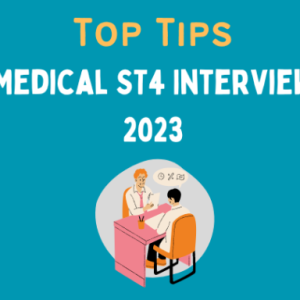
Thursday Aug 10, 2023
Thursday Aug 10, 2023
The author, Nikhil Ahluwalia, is a Medical Registrar who has interviewed and successfully placed many ST4 interview candidates. He shares his top tips, including:
Show your enthusiasm! If you're not excited about the specialty, the interviewers won't be either. Make sure you convey your passion for the field, and smile!
Be prepared to answer common interview questions. The author provides a list of common ST4 interview questions, so you can practice your answers ahead of time.
Be specific about your reasons for choosing the specialty. Don't just say you're interested in the field because it's a good career move. Explain why you're passionate about the work and what you hope to achieve in the specialty.
Highlight your skills and experience. The author recommends using the STAR (Situation, Task, Action, Result) method to answer interview questions about your skills and experience.
Dress professionally and arrive on time. First impressions matter, so make sure you dress appropriately for the interview and arrive on time.
The author also recommends taking an interview skills course to help you prepare for your ST4 interview. MedCourse offers online interview skills resources specifically for ST4 candidates, which includes videos of good and bad example answers, clinical knowledge updates, and SpR-level discussions on the topics that come up in ST4 interviews.
Check out our other guides to medical training, including IMT and CST application.

Thursday Aug 10, 2023
Thursday Aug 10, 2023
Guilt, stress, and remorse are common feelings that doctors new and old feel on a daily basis. In this podcast, we read an article on guilt as a junior doctor, by Dr Kuvira Manamperi.
You can find more experiences on our website, as well as useful blog articles. You can also find Kuvira's other article on becoming an fy1.
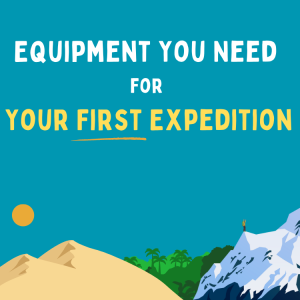
Thursday Jul 06, 2023
Thursday Jul 06, 2023
Going on a medical expedition can be a daunting task, but it is important to be prepared with the right equipment. This article discusses the essential equipment that you will need for your first medical expedition, including medical supplies, personal gear, and expedition-specific gear.
The article begins by discussing the medical supplies that you will need. These supplies include basic first aid supplies, such as bandages, antiseptic wipes, and pain relievers. You will also need more specialized supplies, such as splints, slings, and emergency medications.
The article then discusses the personal gear that you will need. This gear includes clothing, footwear, and camping gear. You will need to choose clothing that is appropriate for the climate and terrain of your expedition. You will also need footwear that is comfortable and supportive. Camping gear, such as a tent, sleeping bag, and stove, will also be essential.
Finally, the article discusses the expedition-specific gear that you will need. This gear includes a first aid kit, a satellite phone, and a GPS device. A first aid kit is essential for any medical expedition. A satellite phone will allow you to communicate with the outside world in case of an emergency. A GPS device will help you to navigate your way through unfamiliar terrain.
The article concludes by stating that the right equipment can make the difference between a successful and unsuccessful medical expedition. By carefully planning your equipment, you can ensure that you are prepared for any eventuality.
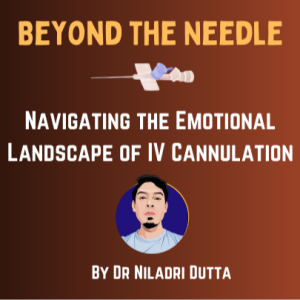
Thursday Jul 06, 2023
Thursday Jul 06, 2023
IV cannulation is a common medical procedure, but it can be emotionally challenging for junior doctors. The article discusses the emotional aspects of IV cannulation, including anxiety, stress, and guilt. It also talks about how to cope with these emotions and provide optimal patient care.
The article begins by describing the emotional challenges that junior doctors may face when performing IV cannulations. These challenges can include the fear of failure, the risk of causing pain to the patient, and the pressure to perform well. The article then goes on to discuss how these emotions can impact patient care. For example, junior doctors who are feeling anxious or stressed may be less likely to take the time to find a good vein, which can lead to more failed attempts and more pain for the patient.
The article then provides some tips on how to cope with the emotional challenges of IV cannulation. These tips include practicing the procedure, seeking support from colleagues, and learning relaxation techniques. The article also emphasizes the importance of self-compassion. Junior doctors should remember that it is normal to feel anxious or stressed about IV cannulations, and that they should not beat themselves up if they make a mistake.
The article concludes by stating that the emotional challenges of IV cannulation are important to acknowledge and address. By understanding these challenges and developing coping mechanisms, junior doctors can provide better care for their patients.
Here are some additional points that are mentioned in the article:
The emotional challenges of IV cannulation can be exacerbated by factors such as a lack of training, a busy workload, and a patient who is uncooperative.
There are a number of resources available to help junior doctors cope with the emotional challenges of IV cannulation, such as support groups, online forums, and counseling services.
It is important for junior doctors to remember that they are not alone in their struggles, and that there are people who can help them.
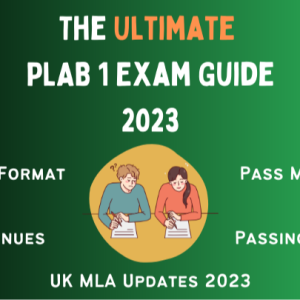
Thursday Jul 06, 2023
Thursday Jul 06, 2023
The PLAB 1 exam is a written, multiple-choice question (MCQ) exam that tests candidates on their ability to approach and manage clinical situations commonly encountered as an FY2 or house officer in UK hospitals. The exam is held four times a year in the UK and in international centres. The GMC released exam seats for August and November 2023 in December 2022, and for the first half of 2024 on March 18, 2023. The GMC also intends on releasing additional slots for the November 2023 exam.
To prepare for the PLAB 1 exam, candidates should start their preparation 3-6 months before the exam. They should read the curriculum, find out their strengths and weaknesses across the curriculum, and join a revision course. Candidates should also practice answering MCQs and learn to reason rather than just memorise obscure facts.
The PLAB 1 exam is a challenging exam, but it is possible to pass with careful preparation. Candidates should start their preparation early, focus on their weaknesses, and practice answering MCQs.
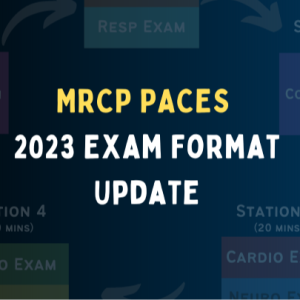
Thursday Jul 06, 2023
Thursday Jul 06, 2023
In this article, we go through the 2023 changes to the MRCP PACES format.
This includes:
Updates to communication skills station
Changes to the clinical encounters
Removal of history stations
If you're still on MRCP Part 1, check out our guide to the part 1 exam or our ultimate guide to IMT.
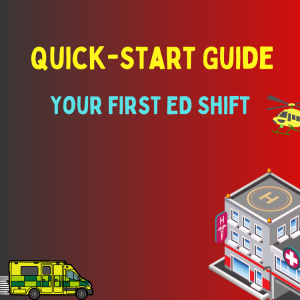
Tuesday May 16, 2023
Tuesday May 16, 2023
Trembling in your boots thinking about your first shift in the emergency department? Don't worry, we got you.
In this article, Dr Callum Airlie gives you his top 11 tips for smashing your first shift, as well as a rundown on how the ED works in the UK.
Thinking about ACCS as a training pathway? Check out our guide to ACCS training.
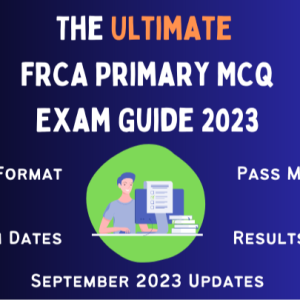
Tuesday May 16, 2023
Tuesday May 16, 2023
For core and accs anaesthetic trainees who need to get to the next stage of their career, the FRCA Primary MCQ is the first exam you'll need to face.
In this article, we go over the exam format, exam dates, pass mark, and the updates for the september 2023 exam.
Check out the FRCA Exam article here.
If you want to know more about Anaesthetics, check out the article on Core Anaesthetics Interview and the Ultimate guide to ACCS.
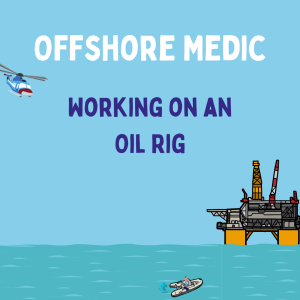
Tuesday May 16, 2023
Tuesday May 16, 2023
In this guide to becoming an offshore medic, Dr Hrushikesh talks you through the qualifications needed to become an offshore medic, as well as his experience of being an oil rig doctor.
Check out the article on becoming an offshore medic here.
Thinking about an alternative career? Check out our blog content on beyond medicine.
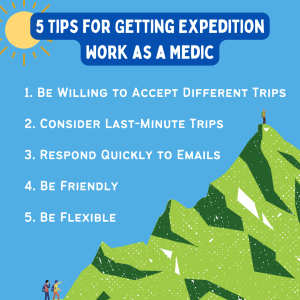
Tuesday Apr 18, 2023
Tuesday Apr 18, 2023
Working as an expedition medic is no doubt exciting, but there are plenty of challenges to getting the job in the first place!
In this article, Dr Dawn Barlow talks you through her tips for getting your first expedition as a junior doctor.
Also check out our expedition medicine and pre-hospital medicine courses to learn more!

Tell Your Story
We are always looking for healthcare professionals to contribute to the MedCourse blog. If you have a story to tell, we want to publish it on our blog page.
Learn more at Our Contribution Page





